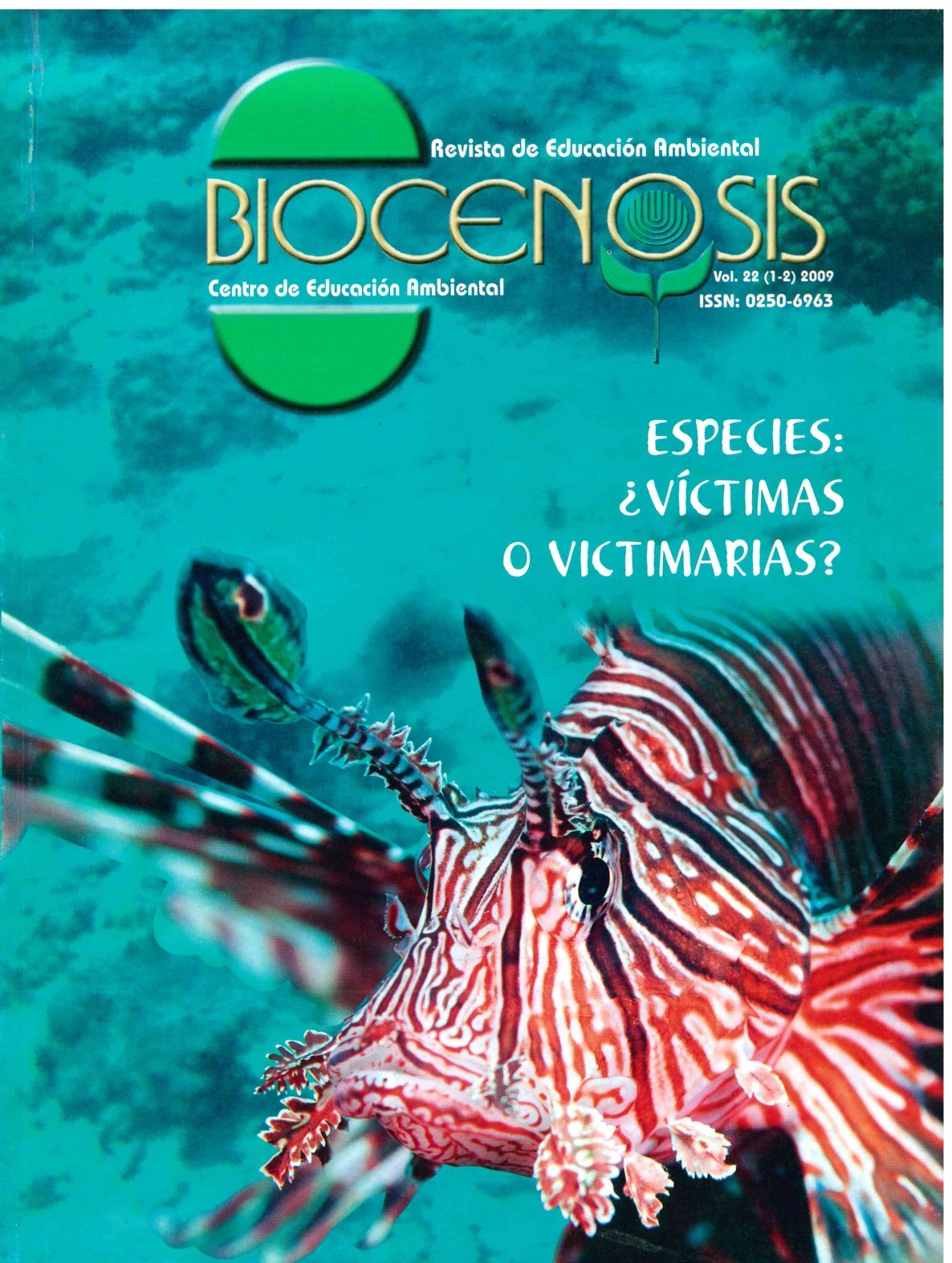Los insectos invasores de Costa Rica
Keywords:
Especie introducida, Especie depredadora, Parasitoides, Control biológico, Plaga.Abstract
Se presenta una recopilación preliminar de los insectos introducidos en Costa Rica. Se estima que existen al menos 300 especies exóticas. Los medios más comunes de introducción son: suelo y hojarasca, desechos, madera, granos almacenados, plantas, vertebrados y otros insectos. Se nota la escasez de especies exóticas entre los insectos acuáticos y ciertos grupos de insectos fitófagos (Auchenorrhyncha, Heteroptera, Chrysomelidae). Los insectos introducidos pueden tener un impacto negativo o positivo en la economía del país (depende de la especie), sin embargo se requiere más investigación para determinar sus efectos ecológicos.
References
ALTIERI, M.A.; C.I. NICHOLLS. 1999. Classical biological control in Latin America, pp. 975-991. En: Bellow, T.S.; T.W. Fisher (eds.), Handbook of Biological Control. San Diego. Academic Press. 1046 pp.
ÁLVAREZ, N.; D. MCKEY; M. HOSSAERT-MCKEY; C. BORN; L. MERCIER; B. BENREY. 2005. Ancient and recent evolutionary history of the bruchid beetle, Acanthoscelides obtectus Say, a cosmopolitan pest of beans. Molecular Ecology,14: 1015-1024.
BECCALONI, G.W. 2007. Blattodea Species File Online. Version 1.2/3.3. World Wide Web electronic publication. <http://Blattodea.SpeciesFile.org> [revisado el 10 de mayo de 2008].
BOYKIN, L.M.; R.G. SHATTERS; R.C. ROSELL; C.L. MCKENZIE; R.A. BAGNALL; P. DEBARRO; D.R. FROHLICH. 2007. Global relationships of Bemisia tabaci (Hemiptera: Aleyrodidae) revealed using Bayesian analysis of mitochondrial COI DNA sequences. Molecular Phylogenetics and Evolution, 44: 1306-1319.
DAVID, J.R.; L. TSACAS. 1981. Cosmopolitan, subcosmopolitan and widespread species: different strategies within the drosophilid family. Comptes Rendus de la Société Biogéographique 57: 11-26.
DISNEY, R.H. 2007. Natural history of the scuttle fly, Megaselia scalaris. Annual Review of Entomology, 53: 39-60.
DURDEN, L.A.; G.G. MUSSER. 1994. The sucking lice (Insecta, Anopleura) of the world: A taxonomic checklist with records of mammalian hosts and geographical distributions. Bulletin of the American Museum of Natural History, 218: 1-90.
HANSON, P.E.; I.D. GAULD, I.D. (eds.) 2006. Hymenoptera de la Región Neotropical. Memoirs of the American Entomological Institute, 77: 1-997.
HILL, D.S. 1994. Agricultural Entomology. Portland, Oregon. Timber Press. 635 pp.
HOLWAY, D.A.; L. LACH; A.V. SUAREZ; N.D. TSUTSUI; T.J. CASE. 2002. The causes and consequences of ant invasions. Annual Review of Ecology and Systematics, 33: 181-233.
KIRKENDALL, L.R.; F. ØDEGAARD. 2007. Ongoing invasions of old-growth tropical forests: establishment of three incestuous beetle species in southern Central America. Zootaxa, 1588: 53-62.
LIEBHOLD, A.M.; P.C. TOBIN. 2008. Population ecology of insect invasions and their management. Annual Review of Entomology, 53: 387-408.
LONGINO, J.T. 2008. Ants of Costa Rica. Revisado el 23 de junio de 2008, de: http://academic.evergreen.edu/projects/ants/AntsofCostaRica.html
LOUNIBOS, L.P. 2002. Invasions by insect vectors of human disease. Annual Review of Entomology, 47: 233-266.
MCGLYNN, T.P. 1999. The worldwide transfer of ants: geographical distribution and ecological invasions. Journal of Biogeography, 26:535-548.
MILLER, G.L.; D.R. MILLER. 2003. Invasive soft scales (Hemiptera: Coccidae) and their threat to U.S. agriculture. Proceedings of the Entomological Society of Washington, 105: 832-846.
MILLER, D.R.; G.L. MILLER; G.W. WATSON. 2002. Invasive species of mealybugs (Hemiptera: Pseudococcidae) and their threat to U.S.agriculture. Proceedings of the Entomological Society of Washington, 104: 825-836.
MILLER, D.R.; G.L. MILLER; G.S. HODGES; J.A. DAVIDSON. 2005. Introduced scale insects (Hemiptera: Coccoidea) of the United States and their impact on U.S. agriculture.Proceedings of the Entomological Society of Washington, 107: 123-158.
MOUND, L.A.; R. MARULLO. 1996. The thrips of Central and South America: An introduction (Insecta: Thysanoptera). Memoirs on Entomology, International, 6: 1-487.
PRICE, R.D.; R.A. HELLENTHAL; R.L. PALMA; K.P. JOHNSON; D.H. CLAYTON. 2003. The chewing lice: world checklist and biological overview.Illinois Natural History Survey Special Publication 24. 501 pp.
QUINTERO, D.; A. AIELLO (eds.) 1992. Insects of Panama and Mesoamerica. Oxford, Reino Unido. Oxford University Press. 692 pp.
ROY, H.E.; E. WAJNBERG (eds.) 2008. From biological control to invasion: the ladybird Harmonia axyridis as a model species. Holanda. Springer. 290 pp. (Republicado de la revista Biocontrol, volumen 53, número 1, 2008)
REGINALDO, C. 1988. Catalog of the living termites of the New World. Arquivos de Zoologia 35: 135-231. Versión en línea: “On-line termite database” (revisado el 26 de junio de 2008).
SCHNEIDER, S.S.; G. DEGRANDI-HOFFMAN; D.R. SMITH. 2004. The african honey bee: factors contributing to a successful biological invasion. Annual Review of Entomology, 49: 351-376.
SKIDMORE, P. 1985. The miology of the Muscidae of the world. Dordrecht. Dr. W. Junk Publishers. 550 pp.
SNYDER, W.E.; E.W. EVANS. 2006. Ecological effects of invasive arthropod generalist predators. Annual Review of Ecology, Evolution and Systematics, 37: 95-122.
VILLALOBOS, W.; D. HOLLIS; C. GODOY; C. RIVERA. 2005. First report of Diaphorina citri (Hemiptera: Psyllidae) in Costa Rica. Insecta Mundi, 19: 191-192.
VOEGTLIN, D.; W. VILLALOBOS; M.V. SÁNCHEZ; G. SABORÍO; C. RIVERA. 2003. Guía de los áfidos alados de Costa Rica. Revista de Biología Tropical 51, Supl. 2: 1-228.
WILLIAMS, D.F. (ed.) 1994. Exotic ants. Biology, impact, and control of introduced species. Boulder, Colorado. Westview Press. 332 pp.
